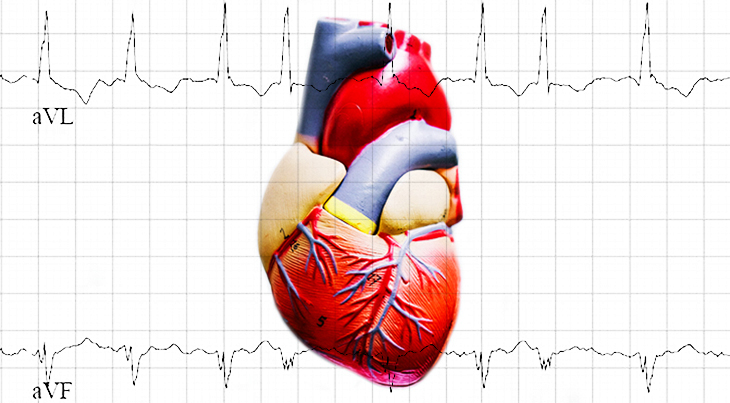Heart Month: Risk Factors & Symptoms of AFib
The American Heart Association tells us that Atrial Fibrillation (AFib) is one type of arrhythmia (abnormal heart rhythm) that becomes more common with aging. The irregular heartbeats that characterize AFib can lead to stroke and other heart-related complications.
 (Blended Photo: A. Hamilton | Source Photos: Heart – NeONBrand via Unsplash & AFib ECG – PeaBrainC CC-BY-SA 4.0)
(Blended Photo: A. Hamilton | Source Photos: Heart – NeONBrand via Unsplash & AFib ECG – PeaBrainC CC-BY-SA 4.0)
All types of AFib can increase the risk of stroke, and people with Atrial Fibrillation are almost 5 times more likely to have a stroke.
Risk Factors for Atrial Fibrillation – The Mayo Clinic
- Older adults/aging – The older you are, the greater the risk of developing atrial fibrillation.
- Heart disease and/or high blood pressure – Any history with heart disease and high blood pressure increases your risk of developing AFib; uncontrolled high blood pressure ups that risk factor.
- Other Chronic Health Issues – thyroid problems, sleep apnea, metabolic syndrome, diabetes, kidney disease, and lung disease.
- Alcohol – Drinking alcohol can cause AFib and binge drinking ups the risk factor.
- Obesity – Extra weight puts you at higher risk for atrial fibrillation.
- Genes – A family history of atrial fibrillation increases the risk factor.
Common Symptoms of Atrial Fibrillation (AFib) – American Heart Association
- Fatigue, particularly when exercising.
- Rapid and irregular heartbeat.
- Fluttering or “thumping” in the chest.
- Dizziness.
- Shortness of breath and anxiety.
- Weakness.
- Faintness or confusion.
- Sweating.
- Chest pain or pressure – never ignore this as it could be a heart attack; call 9-1-1 if you or anyone else is experiencing chest pain.
Maintaining a heart-healthy lifestyle is the best prevention for developing Atrial Fibrillation.
Regardless of your age, don’t ignore irregular heart rhythms, heart palpitations, abnormal heart beats. This video explains the signs and symptoms of arrhythmia.
Note: This article was first published in 2016. It has been updated with new & additional content.
More About Heart Disease, Heart Attacks, High Blood Pressure/Hypertension, And Strokes
Heart Attack Symptoms (men)
Signs of a Heart Attack For Women
Hormone Therapy for Menopause and Heart Disease
High Blood Pressure: Risks, Causes, and Prevention
High Blood Pressure: Fish Oil Supplements
Peripheral Artery Disease: Symptoms & Risk Factors
Strokes: Brain Function and Impacts
What to Say to Someone Who’s Had a Stroke
Health Risks for Aging Couch Potatoes
*This article is for informational purposes only and is not intended as medical or mental health advice, nor is it a substitute for professional medical or mental health advice, diagnosis, or treatment. Always seek the advice of a qualified physician or mental health provider with any questions you may have regarding a medical or mental health condition. In the event of a medical emergency, call a doctor or 911 immediately. This website does not recommend or endorse any specific tests, physicians, products, procedures, opinions, or other information that may be mentioned on the Site or on other websites it links to. Reliance on any information provided by this website or other websites it links to, is solely at your own risk.*
